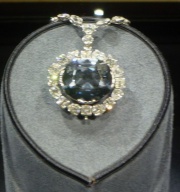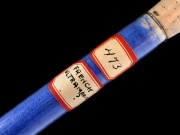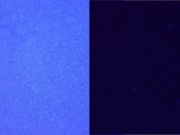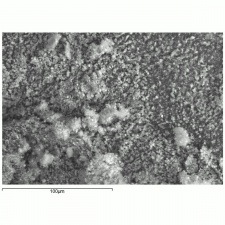Difference between revisions of "French blue"
Jump to navigation
Jump to search
m (Text replace - "== Authority ==" to "== Sources Checked for Data in Record ==") |
|||
| Line 1: | Line 1: | ||
[[File:HopeDiamond1.jpg|thumb|Hope Diamond]] | [[File:HopeDiamond1.jpg|thumb|Hope Diamond]] | ||
== Description == | == Description == | ||
| − | + | [[File:473 french ultramarine.jpg|thumb|French blue]] | |
1) Commercial name used for [[ultramarine blue, synthetic|synthetic ultramarine blue]] originating from the early 19th century when the pigment was first imported from France (Mayer 1969). | 1) Commercial name used for [[ultramarine blue, synthetic|synthetic ultramarine blue]] originating from the early 19th century when the pigment was first imported from France (Mayer 1969). | ||
2) The rough cut stone from which the Hope diamond was cut. The 'French Blue' or 'Tavernier Blue' stone was mined from the Kollur mine in Golconda, India. It was purchased by Jean-Baptiste Tavernier in 1660 who then sold it to King Louis XIV of France. It was stolen in 1792 during the French Revolution. The Hope Diamond, cut from the French blue stone, appeared on the market in 1812. The sotne now resides in the Smithsonian Institution's National Museum of Natural History. | 2) The rough cut stone from which the Hope diamond was cut. The 'French Blue' or 'Tavernier Blue' stone was mined from the Kollur mine in Golconda, India. It was purchased by Jean-Baptiste Tavernier in 1660 who then sold it to King Louis XIV of France. It was stolen in 1792 during the French Revolution. The Hope Diamond, cut from the French blue stone, appeared on the market in 1812. The sotne now resides in the Smithsonian Institution's National Museum of Natural History. | ||
| − | [[File: | + | [[File:Frultra C100x.jpg|thumb|French ultramarine at 100x (visible light left; UV light right)]] |
== Synonyms and Related Terms == | == Synonyms and Related Terms == | ||
| Line 16: | Line 16: | ||
[[[SliderGallery rightalign|f473sem.jpg~SEM|f473edsbw.jpg~EDS]]] | [[[SliderGallery rightalign|f473sem.jpg~SEM|f473edsbw.jpg~EDS]]] | ||
| − | == | + | ==Resources and Citations== |
| − | |||
| − | |||
| − | |||
| − | |||
| − | |||
| − | |||
| − | |||
| − | |||
| − | |||
| − | |||
| − | |||
* Ralph Mayer, ''A Dictionary of Art Terms and Techniques'', Harper and Row Publishers, New York, 1969 (also 1945 printing) | * Ralph Mayer, ''A Dictionary of Art Terms and Techniques'', Harper and Row Publishers, New York, 1969 (also 1945 printing) | ||
Revision as of 15:58, 21 August 2022
Description
1) Commercial name used for synthetic ultramarine blue originating from the early 19th century when the pigment was first imported from France (Mayer 1969).
2) The rough cut stone from which the Hope diamond was cut. The 'French Blue' or 'Tavernier Blue' stone was mined from the Kollur mine in Golconda, India. It was purchased by Jean-Baptiste Tavernier in 1660 who then sold it to King Louis XIV of France. It was stolen in 1792 during the French Revolution. The Hope Diamond, cut from the French blue stone, appeared on the market in 1812. The sotne now resides in the Smithsonian Institution's National Museum of Natural History.
Synonyms and Related Terms
1) French ultramarine
2) Blue Diamond of the Crown; Tavernier blue; Hope Diamond
Resources and Citations
- Ralph Mayer, A Dictionary of Art Terms and Techniques, Harper and Row Publishers, New York, 1969 (also 1945 printing)
- Wikipedia, the free encyclopedia, at http://www.wikipedia.com Comment: http://en.wikipedia.org/wiki/French_Blue (Accessed Sept. 7, 2005)




